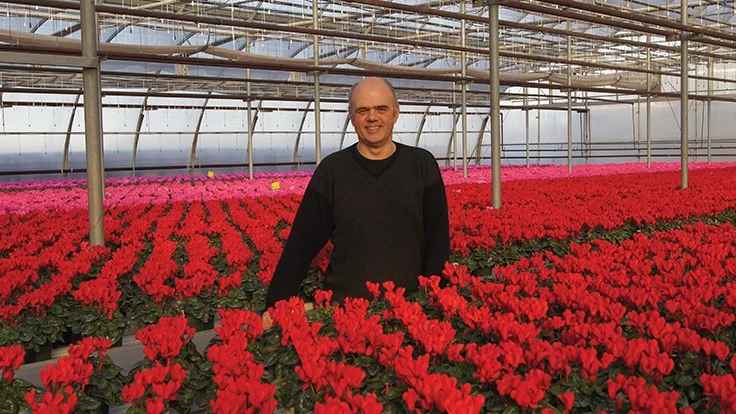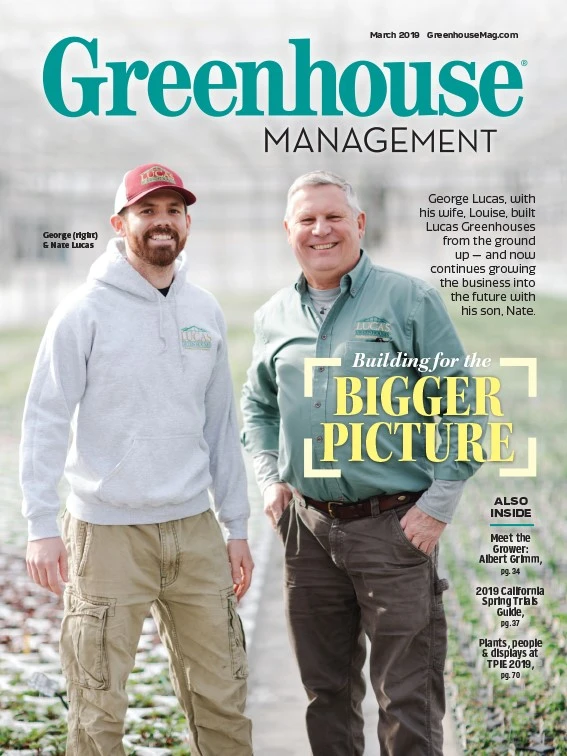

Growing up in Germany, Albert Grimm didn’t plan on pursuing a greenhouse career — he wanted to study physics. “But my family didn’t have the financial means to support me, and student loans didn’t exist in the form that we know them today,” says Grimm, whose father was a greenhouse grower. “So I took what I could get and entered into a horticulture apprenticeship.”
Grimm’s apprenticeship was rigorous, set up as a binding three-year contract where he attended trade school for several hours each week and worked full-time the rest of the week. To graduate from the program, he had to pass trade school exams in addition to “a series of practical exams, where a committee of industry trade masters grill you for several days on your technical knowledge, practical aptitude, general plantsmanship and ability to perform manual tasks with adequate accuracy,” he says.
“I have to admit that I loathed greenhouse work for most of my apprenticeship,” Grimm says, “and if I would not have been forced by circumstances, I would not have lasted for three years.”
But as Grimm continued to build experience and expertise, he unlocked new opportunities in the green industry. An exchange program enabled him to spend a summer working in Canada in 1986; he fell in love with the country and soon made it his home. He immigrated to Canada in 1988 and worked in several greenhouses before joining Jeffery’s Greenhouses in 1998. Since then, his role as head grower has evolved from growing plants to growing people, as he shares his knowledge and experience to cultivate the next generation of growers.
“When I started here, I was primarily engaging in very practical daily details such as water management and fertigation. With time, I was able to delegate these details to junior growers, and I engaged myself with increasingly complex aspects of our production,” Grimm says. “Managing others does not come easy for me, but I see it as an important part of my job to act as a mentor and role model.”

Encouraging cooperation
When Grimm joined Jeffery’s, the growing operation was very structured.
“The roles of growers in a lot of greenhouses are very defined: ‘You look after this crop in this greenhouse, and somebody else will look after a different crop in a different greenhouse,’” he says. “But we very purposefully changed that to avoid a strict hierarchy, because we wanted cooperation between growers, not competition.”
Jeffery’s Greenhouses spans approximately 23 acres of greenhouse space across two separate facilities in St. Catharines, Ontario, employing 45 full-time production staff and just as much seasonal help. Now, although there are primary growers assigned to specific crops and supervisors who coordinate tasks, “Cooperation is an explicit job requirement,” Grimm says. “All growers are expected to cooperate across the entire acreage. We expect them to be able to function in all of the crop areas to stay in tune with what’s happening across the greenhouse.”
This way, growers learn everything from propagation to finishing crops, and every step in between, as part of a collaborative team.

Learning to lead
Over the years, Grimm taught and mentored many students — not just at Jeffery’s, but also through the classes he instructed at Niagara College and the workshops he taught at Vineland Research Station (now Vineland Research and Innovation Centre).
A key resource that helped Grimm develop his managerial skills was the Dale Carnegie Course, which he completed in 2000. One of the most valuable lessons Grimm learned from his management experience was the value of leading by example.
“You cannot expect somebody to do something that you are not able or willing to do yourself,” he says. “Before I can demand that somebody work on a transplant line, sticking cuttings or trimming plants, I have to be able to do that job. If I expect growers to be here after hours to complete pesticide sprays, then I have to be willing to do the same thing, and they have to see that.”
Embracing change
For the greenhouse industry to advance into the future, Grimm says more operators have to make the transition from just cultivating plants to cultivating the next generation of leaders. He knows his junior growers won’t do things exactly the same way he did, and that’s what will move the industry forward.
“A lot of growers have a difficult time stepping away from the principles that worked 50 years ago,” he says. “But if you have expectations that are too high or specific for the people that you pass your knowledge to, then you’re going to get very frustrated. The people who come after me will do things differently, so I have to tell them what I would do and then let them do what they think is best. If we don’t do that, we don’t move forward, and we don’t create change.”

Explore the March 2019 Issue
Check out more from this issue and find your next story to read.
Latest from Greenhouse Management
- Anthura acquires Bromelia assets from Corn. Bak in Netherlands
- Top 10 stories for National Poinsettia Day
- Langendoen Mechanical hosts open house to showcase new greenhouse build
- Conor Foy joins EHR's national sales team
- Pantone announces its 2026 Color of the Year
- Syngenta granted federal registration for Trefinti nematicide/fungicide in ornamental market
- A legacy of influence
- HILA 2025 video highlights: John Gaydos of Proven Winners





